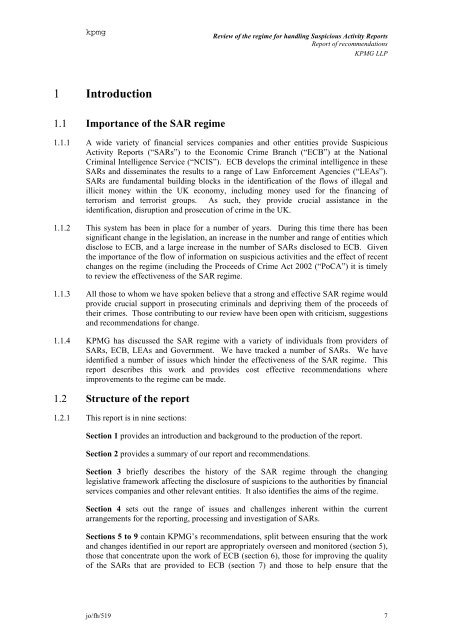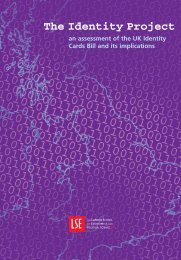Money Laundering: Review of the Reporting ... - Dematerialised ID
Money Laundering: Review of the Reporting ... - Dematerialised ID
Money Laundering: Review of the Reporting ... - Dematerialised ID
Create successful ePaper yourself
Turn your PDF publications into a flip-book with our unique Google optimized e-Paper software.
kpmg<br />
<strong>Review</strong> <strong>of</strong> <strong>the</strong> regime for handling Suspicious Activity Reports<br />
Report <strong>of</strong> recommendations<br />
KPMG LLP<br />
1 Introduction<br />
1.1 Importance <strong>of</strong> <strong>the</strong> SAR regime<br />
1.1.1 A wide variety <strong>of</strong> financial services companies and o<strong>the</strong>r entities provide Suspicious<br />
Activity Reports (“SARs”) to <strong>the</strong> Economic Crime Branch (“ECB”) at <strong>the</strong> National<br />
Criminal Intelligence Service (“NCIS”). ECB develops <strong>the</strong> criminal intelligence in <strong>the</strong>se<br />
SARs and disseminates <strong>the</strong> results to a range <strong>of</strong> Law Enforcement Agencies (“LEAs”).<br />
SARs are fundamental building blocks in <strong>the</strong> identification <strong>of</strong> <strong>the</strong> flows <strong>of</strong> illegal and<br />
illicit money within <strong>the</strong> UK economy, including money used for <strong>the</strong> financing <strong>of</strong><br />
terrorism and terrorist groups. As such, <strong>the</strong>y provide crucial assistance in <strong>the</strong><br />
identification, disruption and prosecution <strong>of</strong> crime in <strong>the</strong> UK.<br />
1.1.2 This system has been in place for a number <strong>of</strong> years. During this time <strong>the</strong>re has been<br />
significant change in <strong>the</strong> legislation, an increase in <strong>the</strong> number and range <strong>of</strong> entities which<br />
disclose to ECB, and a large increase in <strong>the</strong> number <strong>of</strong> SARs disclosed to ECB. Given<br />
<strong>the</strong> importance <strong>of</strong> <strong>the</strong> flow <strong>of</strong> information on suspicious activities and <strong>the</strong> effect <strong>of</strong> recent<br />
changes on <strong>the</strong> regime (including <strong>the</strong> Proceeds <strong>of</strong> Crime Act 2002 (“PoCA”) it is timely<br />
to review <strong>the</strong> effectiveness <strong>of</strong> <strong>the</strong> SAR regime.<br />
1.1.3 All those to whom we have spoken believe that a strong and effective SAR regime would<br />
provide crucial support in prosecuting criminals and depriving <strong>the</strong>m <strong>of</strong> <strong>the</strong> proceeds <strong>of</strong><br />
<strong>the</strong>ir crimes. Those contributing to our review have been open with criticism, suggestions<br />
and recommendations for change.<br />
1.1.4 KPMG has discussed <strong>the</strong> SAR regime with a variety <strong>of</strong> individuals from providers <strong>of</strong><br />
SARs, ECB, LEAs and Government. We have tracked a number <strong>of</strong> SARs. We have<br />
identified a number <strong>of</strong> issues which hinder <strong>the</strong> effectiveness <strong>of</strong> <strong>the</strong> SAR regime. This<br />
report describes this work and provides cost effective recommendations where<br />
improvements to <strong>the</strong> regime can be made.<br />
1.2 Structure <strong>of</strong> <strong>the</strong> report<br />
1.2.1 This report is in nine sections:<br />
Section 1 provides an introduction and background to <strong>the</strong> production <strong>of</strong> <strong>the</strong> report.<br />
Section 2 provides a summary <strong>of</strong> our report and recommendations.<br />
Section 3 briefly describes <strong>the</strong> history <strong>of</strong> <strong>the</strong> SAR regime through <strong>the</strong> changing<br />
legislative framework affecting <strong>the</strong> disclosure <strong>of</strong> suspicions to <strong>the</strong> authorities by financial<br />
services companies and o<strong>the</strong>r relevant entities. It also identifies <strong>the</strong> aims <strong>of</strong> <strong>the</strong> regime.<br />
Section 4 sets out <strong>the</strong> range <strong>of</strong> issues and challenges inherent within <strong>the</strong> current<br />
arrangements for <strong>the</strong> reporting, processing and investigation <strong>of</strong> SARs.<br />
Sections 5 to 9 contain KPMG’s recommendations, split between ensuring that <strong>the</strong> work<br />
and changes identified in our report are appropriately overseen and monitored (section 5),<br />
those that concentrate upon <strong>the</strong> work <strong>of</strong> ECB (section 6), those for improving <strong>the</strong> quality<br />
<strong>of</strong> <strong>the</strong> SARs that are provided to ECB (section 7) and those to help ensure that <strong>the</strong><br />
jo/fh/519 7









